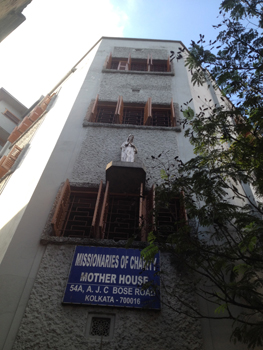For Sunday July 19, 2015
Lectionary Readings (Revised Common Lectionary, Year B)
1 Samuel 7:1-14a
Psalm 23
Ephesians 2:11-22
Mark 6:30-34, 53-56
A couple of years ago, my husband, children and I visited Calcutta, where my husband grew up. My parents-in-law's apartment building is right in the urban thick of the city, and so staying there for any length of time requires a full-immersion baptism of the senses.
Car horns blare day and night. Bollywood music, blasting through tinny car speakers, competes with the ancient and eerie chants of the imams, calling the Muslim faithful to prayer. Roosters crow at odd hours, and crows begin screeching at dawn. The air smells thick and close. Like ash, sweat, and street food.
Tea-sellers, businessmen, wedding processions, and uniformed schoolchildren share the dusty streets with cows, goats, chickens, and feral dogs. Traffic "laws" are optional at best, forcing buses, cars, bicycles, and autorickshaws to vie for dominance at every intersection. There's no place to go where there aren't people, people, and more people.
Calcutta, in other words, is not the vacation spot to choose if you seek quiet, rest, and solitude. Rather, it's the kind of place that makes serious demands on your heart and body. Demands of patience, flexibility, and fortitude. Demands of compassion.
So Calcutta came repeatedly to mind as I contemplated this week's lectionary reading from the Gospel of Mark. The lection is odd, a disjointed cut-and-paste job that brackets Jesus' feeding of the five thousand to focus on the seemingly less spectacular events that precede and follow it.
 |
|
Mother Teresa
|
Mark 6:30-34 describes the return of the disciples from their first ministry tour — their inauguration into apostleship. Exhilarated and exhausted, they have stories to tell Jesus — thrilling stories of healings, exorcisms, and effective evangelistic campaigns. Perhaps there are darker stories in the mix as well — stories of failure and rejection. Hard stories they need to process privately with their Teacher.
Whatever the case, Jesus senses that the disciples need a break. They're tired, overstimulated, underfed, and in significant need of solitude.
Jesus, meanwhile, is not in top form himself. He has just lost John the Baptist, his beloved cousin and prophet, the one who baptized him and spent a lifetime in the wilderness preparing his way. Worse, Jesus has lost him to murder, a terrifying reminder that God's beloved are not immune to violent, senseless deaths. Maybe Jesus' own end feels closer. In any case, he's heartbroken.
"Let's go off by ourselves to a quiet place and rest awhile," he says to his disciples as the crowds throng around them at the edge of the Sea of Galilee. "Come away with me," is how another translation puts it, and I hear both tenderness and longing in those words. Yes, Jesus wants to provide a time of rest and recuperation for his friends. But he's weary, himself; the hunger he articulates here is his own.
Lesson One for me? Pay more attention to the "throwaway" passages in the Gospels, those little transition verses which often precede or follow the "main events" of Jesus' life story. Passages like Luke 5:16: "But Jesus often withdrew to lonely places and prayed." Or Mark 11:12: "The next day as they were leaving Bethany, Jesus was hungry." Or Matthew 8:24: "Jesus was sleeping." Or Mark 7:24: "He didn't want anyone to know which house he was staying in."
In these "minor" verses, I see essential glimpses of Jesus' human life — the life I can relate to most readily. His need to withdraw, his desire for solitary prayer, his physical hunger, his sleepiness, his inclination to hide.
These glimpses take nothing away from Jesus' divinity; they enhance it, making it richer and all the more mysterious. They remind me that the doctrine of the Incarnation truly is Christianity's best gift to the world. God — the God of the whole universe — hungers, sleeps, eats, rests, withdraws, and grieves. In all of these mundane but crucial ways, our God is like us.
He's also like us in that sometimes, his best-laid plans go awry. According to St. Mark, Jesus' retreat-by-boat idea fails. The crowds anticipate his plan, and follow on foot. By the time he and his disciples reach their longed-for destination, the crowds are waiting, and the quiet sanctuary Jesus seeks is nowhere to be found. Maybe what he faces isn't quite the urban onslaught of Calcutta, but it's definitely a first-century wilderness equivalent.
Does Jesus run? Does he turn the boat around and sail away? No. As Mark puts it, "Jesus saw the huge crowd as he stepped from the boat, and had compassion on them because they were like sheep without a shepherd. So he began to teach them many things."
 |
|
Mother House.
|
The second half of this week's lection essentially offers a repeat of the first. The miraculous feeding of the five thousand over, Jesus once again "insists" that the disciples get back in the boat and sail away. Vacation Attempt, Take Two.
But once again, according to Mark 6:53-56, the crowds anticipate Jesus' plan, and word spreads. As soon as the boat lands at Gennesaret, the crowds go wild, pushing and jostling to get close to Jesus. They carry their sick to him on mats. In every village and city Jesus approaches, swarms of people needing healing line the marketplaces. They press against him. They plead. They beg to touch the fringe of his robe and receive healing.
Jesus' response? Once again, his response is compassion. "All who touched him were healed."
One of the visits my family made in Calcutta is to "Mother House," the headquarters of the Missionaries of Charity, and the home where Mother Teresa lived, served, died, and is now laid to rest. We saw the tiny bedroom where she slept from the 1950s until her death in 1997. We saw her tomb, now a place of pilgrimage and silent meditation for people of all faiths. We saw countless photographs of Mother Teresa out among the poor she spent her days and nights serving. Jostling crowds. Outstretched hands. Noisy and desperate petitions. An endless cacophony of need.
Ten years after her death, Mother's Teresa's private letters to her spiritual advisors were published in a volume entitled, Come Be My Light, and the struggle those letters revealed shocked both admirers and critics of Calcutta's 20th-century saint. Contrary to popular belief, Mother Teresa did not enjoy perpetual — or even frequent — spiritual bliss as she went about doing the "Lord's work." Instead, she experienced despair, doubt, loneliness, and the seeming abandonment of God. Her "dark night of the soul" lasted for decades.
Often in her letters, she berated herself for this "darkness," until finally, she came to believe that God was allowing her to identify intimately with the suffering of those he had called her to serve. For Mother Teresa, compassion was neither straightforward nor comfortable. It was birthed in her at great cost. Wrenched from her through darkness and pain.
My own in-laws have served as missionaries in Calcutta for close to five decades. My father-in-law's efforts to share Christ's love with his adopted city have been tireless. As a preacher, a mentor, a Bible School principal, and an evangelist, he has blessed more people than any of us in the family can count. Meanwhile, the needy strangers my mother-in-law has welcomed, fed, sheltered, and mothered over the years number in the thousands. Growing up, my husband often called his home, "Grand Central Station." It was perpetually full of guests.
Despite their age and physical frailty, my in-laws refuse to slow down. "The needs are too great," my father-in-law tells us when we encourage him to consider retirement. "There's still so much work to do."
In some ways, I envy him the stark acuity of such need. Here, in my cozy middle-class American life, it's too easy to pass the buck on compassion. Whether I'm looking at the needs of my own family, my seemingly self-sufficient neighbors, or the wider community, it's tempting to tell myself that nothing urgent is at stake. Everything can wait. After all, I'm not the last stop, am I? Not much depends on me.
Or does it? I think this week's Gospel reading is about the ongoing and necessary tension between compassion and self-protection. Guess what? Jesus lived with this tension, too.
 |
|
Calcutta.
|
On the one hand, he was unapologetic about his need for rest and solitude. He saw no shame in retreating when he and his disciples needed a break.
On the other hand, he never allowed his weariness to overwhelm his compassion. Unlike me, he realized that he was the last stop for those aching, desperate crowds — those sheep without a shepherd. Unlike me, his personal boundaries were finally less important to him than his desire to love others.
Is there a lesson here? I'm not sure. Strive for balance? Recognize weariness when you feel it? Don't apologize for being human? Take breaks?
Yes. All of those essential things. But maybe also — and most importantly — this: We live in a world of dire and constant need. Sheep die without their shepherds. There are stakes, and sometimes, what God demands of our hearts is costly.
While balance remains the ideal, it won't always be available in the short-term. Sometimes, we will have to "err." We'll have to bend out of balance.
If that happens, what should we do? In what direction should we bend? If this week's Gospel story is our example, then the answer is clear. Err on the side of compassion. Jesus did.
Image credits: (1, 2) Wikipedia.org; and (3) Persblog.be.





